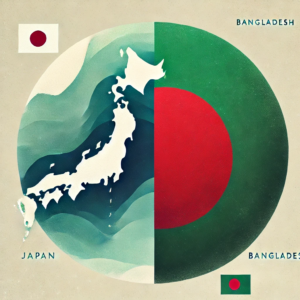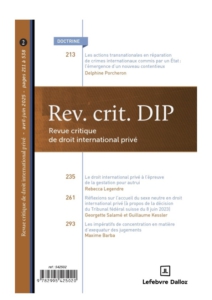Views
Caught Between Legal Boundaries: Child Custody Disputes Across Japan and Bangladesh
I would like to express my sincere gratitude to MD Sanwar HOSSAIN, LLB (Hons) Wolverhampton University, MSS (Dhaka University), PgDiP (Northumbria University), Barrister at law (Hon’ble Society of Lincoln’s Inn), Advocate (Appellate Division) Supreme Court of Bangladesh and Managing Partner, S Hossain & Associates law office, for bringing the Bangladesh courts’ decisions to my attention.

I. Introduction
The breakdown of an international marriage often leads to complex cross-border disputes, especially when children are involved. Tensions can intensify if one parent decides to take the children to their home country, often without the consent of the other parent.
In such cases, when the countries involved are signatories to the HCCH 1980 Child Abduction Convention, the Convention’s mechanisms are designed to facilitate the prompt return of children to their country of habitual residence. This framework aims to prevent unilateral relocations that could have lasting impacts on the child’s stability. However, when one or both countries are not parties to the Convention, resolving such cases becomes significantly more challenging. In such cases, national courts are compelled to address competing custody claims, assess allegations of wrongful removal, and determine whether they have jurisdiction to hear the case, all while balancing, often quite differently, the best interests of the children involved.
The case presented here is just one of many unreported cases where a romance relationship turns sour, leading to lengthy and contentious legal battles across jurisdictions. This note will focus on the Bangladeshi court’s treatment of the case, as it offers useful insights into the court’s approach to handling such complex cross-border disputes.
Anti-Suit Injunctions and Dispute Resolution Clauses
By Adeline Chong, Singapore Management University
- Introduction
In two decisions decided within a fortnight of each other, the Singapore Court of Appeal considered anti-suit injunctions pursued to restrain proceedings allegedly brought in breach of arbitration agreements. The first case, Asiana Airlines, Inc v Gate Gourmet Korea Co, Ltd (‘Asiana Airlines’)[1] dealt with whether A could rely on an arbitration agreement between A and B to restrain B’s proceedings against C, a third party. The second case, COSCO Shipping Specialized Carriers Co, Ltd v PT OKI Pulp & Paper Mills (‘COSCO Shipping’)[2] considered whether an arbitration agreement covered a tortious claim. To put it in another way, Asiana Airlines mainly concerned the ‘party scope’ of an arbitration agreement while COSCO Shipping concerned the ‘subject matter’ scope of an arbitration agreement.[3] Where the anti-suit application is to restrain foreign proceedings brought in breach of an arbitration or choice of court agreement, ordinarily it would be granted unless ‘strong cause’ is shown by the respondent.[4] This provides an easier path for the anti-suit claimant compared to the alternative requirement of establishing that the foreign proceedings are vexatious or oppressive in nature. Read more
Trending Topics in German PIL 2024 (Part 2 – Online Marriages, Gender Afiliation and Name Law)
As already mentioned in my previous post, at the end of each year I publish an article (in German) about the Conflict of Laws developments in Germany of the last twelve months, covering more or less the year 2024 and the last months of 2023. This post is the second with an overview over those topics that seem to be most trending.
The two parts focus on the following topics (part 1 contained 1. and 2.):
- Restitution of Money lost in Illegal Gambling
- Applicable Law in the Dieselgate litigation
- The (Non-)Valitidy of Online Marriages
- New German conflict-of-law rules regarding gender afiliation / identity
- Reforms in international name law
I will now give attention to the last three topics that focus on the three areas that are not harmonized by EU law (yet) and are mainly questions of family law.
News
Revue Critique de droit international privé – Issue 2025/2
 Written by Hadrien Pauchard (assistant researcher and doctoral student at Sciences Po Law School)
Written by Hadrien Pauchard (assistant researcher and doctoral student at Sciences Po Law School)
The second issue of the Revue Critique de droit international privé of 2025 has just been released. It contains four articles, seven case notes and numerous book reviews. In line with the Revue Critique’s recent policy, the doctrinal part will soon be made available in English on the editor’s website (for registered users and institutions). Read more
Out Now: Gössl/Kienle, Grundkurs Internationales Privat- und Zivilverfahrensrecht
Any student of German private international law will take delight in the news that a new textbook has just been published by our co-editor Susanne Goessl together with Florian Kienle. The book covers questions of both the applicable law (internationales Privatrecht) and of jurisdiction and foreign judgments (internationales Zivilverfahrensrecht), with a certain focus on the former area. As one might expect from a new text, it puts the European instruments of private international law (and the areas governed by them) into the centre (pp. 16–144) – without neglecting the areas that remain governed by domestic law (pp. 145–282).
Readers looking to familiarize themselves with German PIL will appreciate the concise introduction to the field (pp. 1–15), the comprehensive coverage of fundamental questions (such as renvoi, characterisation, etc.; starting at p. 157), and the revision questions provided at the end of each chapter. Above all else, however, they will notice the many topical examples used by the authors to explain the material, ranging from climate change and human rights litigation to Covid, the Volkswagen emissions scandal, and the 2021 Suez Canal obstruction by the Ever Given. The wealth of these examples alone makes the book a great read even for those who may consider themselves already well acquainted with German PIL (not least if they need to teach it).
More information on the book is available here.
Private International Law and Sustainable Development in Africa
Editors:
Dr Chukwuma Okoli, Dr Eghosa O. Ekhator, Professor Veronica Ruiz Abou-Nigm, Professor Ralf Michaels, Hans van Loon
Originally sourced from Max Planck Institute for Comparative and International Private Law post on 22 July 2025, with slight amedments.
Recall, on 14 October 2024, we invited submissions to The Journal of Sustainable Development and Policy for a special issue focusing on “Private International Law and Sustainable Development in Africa.”
Make today matter! Under this motto, legal scholars from all over the world gathered at the University of Pretoria on July 8, 2025 to take part in the conference “Sustainable Development and Transnational Law in Africa”. The event was jointly organized by the Law Schools Global League and Max Planck Institute for Comparative and International Private Law with a view to fostering academic exchange across continents on today’s most pressing challenges.
“It was fantastic to see the breadth and depth of work done in and on Africa within the new field of sustainable development and private international law. Thanks are due also to our co-organizers at the Law Schools Global League ant the University of Pretoria; it is so important to hold conferences like this one outside of Europe,” says Max Planck Institute’s Director Ralf Michaels.
The conference program consisted of four panel discussions (for a report, see ? here). The last two panels brought together five of the participants in a current project titled “Private International Law and Sustainable Development in Africa”**:
Solomon Okorley (University of Johannesburg) spoke about International Child Abduction Jurisprudence in South Africa; Grihobou Roland Nombré (Thomas SANKARA University School of Law) discussed the implications of the rise of Nuclear Energy in Africa for Private International Law; Michael K. Quartey (University of Johannesburg) and Theophilus Edwin Coleman (University at Buffalo School of Law & University of Johannesburg) addressed Product Liability Disputes in Ghana from the perspective of sustainable development, and Panji Chirwa (University of Pretoria) looked at the Impact of the EU Directive 2024/1760 on African Sustainability Frameworks.
** The project “Private International Law and Sustainable Development in Africa” forms the African component of the broader initiative “The Private Side of Transforming our World – UN Sustainable Development Goals 2030 and the Role of Private International Law” (see ? here), led globally by Ralf Michaels (Max Planck Institute), Hans Van Loon (previously Secretary General of the Hague Conference on Private International), and Veronica Ruiz Abou-Nigm (University of Edinburgh). The African initiative is spearheaded by Chukwuma Samuel Adesina Okoli (University of Birmingham), in partnership with Eghosa Ekhator (University of Derby) and the Journal of Sustainable Development Law and Policy (Afe Babalola University, Nigeria), and works closely with the global project leaders.



